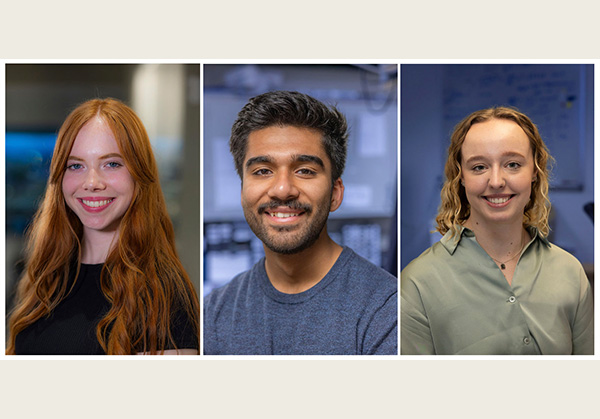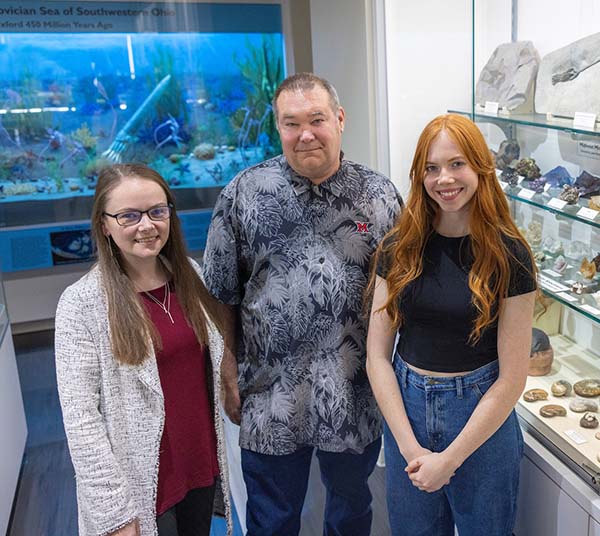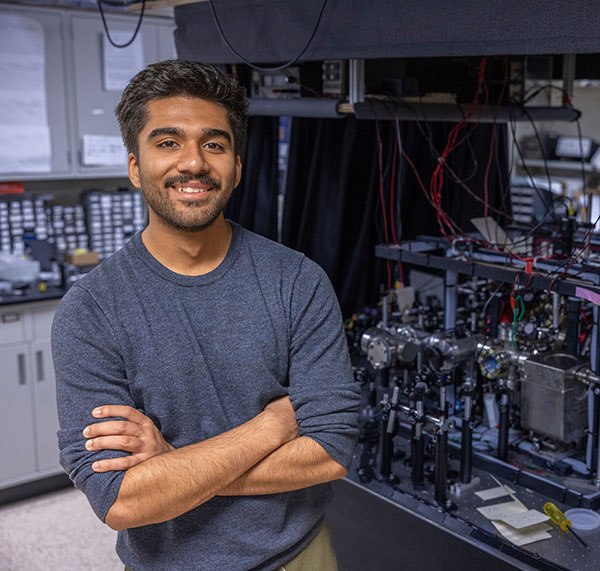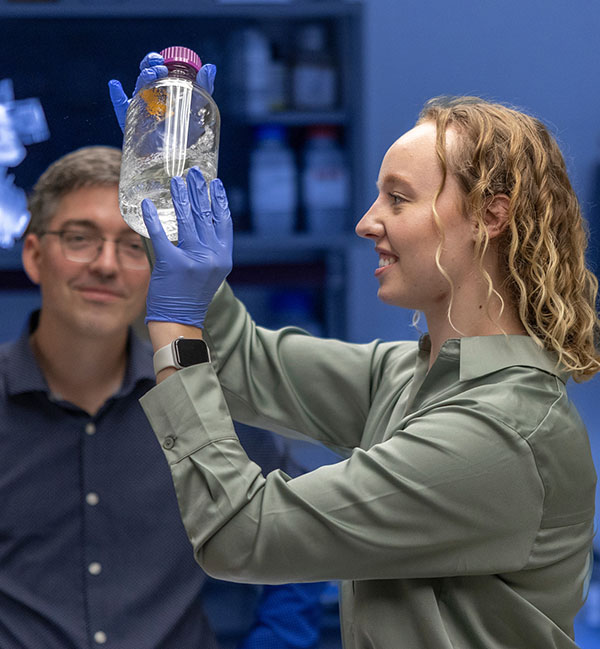Three Miami University students selected as 2024 Goldwater Scholars
Miami University juniors Audrey Allen, Chanakya Pandya, and Cece Meinking were named Goldwater Scholars for 2024-2025. They are among 438 students nationwide to receive the scholarship

Three Miami University students selected as 2024 Goldwater Scholars
Miami University juniors Audrey Allen, Chanakya Pandya, and Cece Meinking were named Goldwater Scholars for 2024-2025. They are among 438 students nationwide to receive the scholarship, the premier undergraduate award for students intending a research career in mathematics, natural sciences, and engineering.
The Miami students are three of nine Goldwater Scholars selected from Ohio public universities this year. Nationwide, faculty nominated more than 1,353 students for the scholarship, worth up to $7,500 per year.
Mark Krekeler, associate professor of Geology and Environmental Earth Science and of Mathematical and Physical Sciences, is faculty mentor to Allen. Krekeler was also faculty mentor to Miami’s 2021 Goldwater Scholar Ethan Klein and 2023 Goldwater Scholar Hannah Wudke. “There is a lot of hidden work that goes into reaching this kind of excellence,” Krekeler said. “These students work continuously, some from almost the start of their first year, to engage in and work toward scientific goals. We try to find matches for students as far as their projects and what their interests are,” he said.
“Miami is really good at creating opportunity, and I think the main driver in that is the faculty,” Krekeler said. “We have a diverse set of engaged faculty who truly care about students' success at every level, from the time that they walk in to after they leave as alumni.”
- View a video of the students and faculty mentors after the story below, or on the Miami University YouTube channel.
Audrey Allen, Environmental Earth Science major, Sustainability co-major, and Entrepreneurship minor

Allen, from Versailles, began undergraduate research her second semester at Miami, working with Krekeler and co-faculty mentor Claire McLeod, associate professor of Geology and Environmental Earth Science.
Her research projects have focused on geochemical analysis of sediments and sand and investigating their ability to absorb metals, such as mercury, associated with coal pollution.
She is first author on a paper published this month in Environmental Advances about her work analyzing road sediment near a coal combustion plant, “Investigating Mercury in Road Sediment in Michigan City, Indiana: A New Type of Environmental Pollution Record.”
“Audrey is a special case where she has found something that she is deeply, deeply passionate about and is committed to,” Krekeler said.
“As climate change becomes a more pressing matter, I think any finding in this area (of research) is necessary,” Allen said. “As I have new projects and accomplish new goals, it feels like a step in the right direction for the environment as a whole.”
Last summer she was selected for the Miami University Research Experience for Undergrads (REU) program in Ecology and Environment, a summer research program supported by the National Science Foundation (NSF). Her current research project builds on her REU project, analyzing sands from coastal areas of Puerto Rico as a proof of concept study, investigating their potential as a medium for water filtration.
She is co-author of another paper about this project, recently submitted to Environmental Earth Science for publication.
“Audrey is a great scholar because she is collaborative — and she brings a very strong enthusiasm to her work,” Krekeler said.
Outside of the lab, Allen is part of the Honors College and Miami University Marching Band color guard, and president of Miami’s chapter of the American Institute for Professional Geologists. She plans to pursue a Ph.D. in geochemistry, with a goal of teaching at a research university and conducting research in environmental restoration.
Chanakya Pandya: Physics, Computer Science, and Mathematics triple major

Pandya, from Mason, began undergraduate research with faculty mentor Samir Bali, professor of Physics, in Bali’s cold atom and optical lattices lab during winter term of his first year at Miami.
His research explores the principle of Brownian ratcheting. “The cool thing about this principle is that we are essentially putting atoms in a lattice, and we are moving them through individual wells in the lattice without applying any sort of net force to the system,” Pandya explained.
This has applications for nanotechnology, such as building artificially efficient nanomachines that could be used in medicine or industry. “I think we've determined that the best way forward to building efficient artificial nanomachines is to be able to harness environmental noise and random fluctuations in the environment to achieve productive motion,” Pandya said.
He has designed and constructed novel instrumentation for in-lab use and presented a demonstration of his work at national meetings, including a workshop for the Frontiers in Optics and Laser Science conference.
He has worked as a research assistant for Bali the past two summers, and this summer he will participate in the Physics/JILA REU program at the University of Colorado Boulder.
“Chanakya has his heart set on joining a top-level Ph.D. program in physics,” Bali said. “He is ambitious and driven, but with a fun attitude that translates well to his interactions with younger students.”
One of the biggest things that motivates Pandya is that he enjoys the research and work in the lab. “It’s just fun. I like being in the lab, I like the work that I do,” Pandya said. “This work made me learn that you have to enjoy the day-to-day of what you're doing, rather than just being focused on the end goals.”
That outlook helps him manage his schedule as well. “Physics, computer science, and mathematics are already very interlinked,” Pandya said. “It was through doing research in high school that I realized just how helpful a strong background in computer science would be” for understanding physics, while “learning new math to describe the physical phenomena that I've been working with has helped me combine my three passions into one directed goal.”
Bali said, “Chanakya’s success at his own instrumentation-building project, his doggedly persistent participation in our main cold atom nanodevice experiment, his ability to follow instructions as a team-player as well as provide effective instruction to younger mentees, and his willingness to take on more responsibility with increasing maturity, lead me to strongly believe that he will succeed as a Ph.D. researcher and scientist.”
Pandya is a physics mentor, part of Miami's Honors College, and a member of the Society for Physics Students. He plans to pursue a Ph.D. in Physics with a focus on quantum information and aims to do research in industry and help build more versatile quantum computers.
Cece Meinking: Biochemistry and Music Performance (viola) double major

Meinking, from Centerville, began undergraduate research with faculty mentor Kevin Yehl, assistant professor of Chemistry and Biochemistry, the summer after her first year at Miami, as an Undergraduate Summer Scholar (USS).
The following summer (2023), she was selected as a Beckman Scholar. The Beckman Scholar award supports undergraduate research and faculty mentoring for select students in chemistry, biochemistry, and the biological sciences on research that extends over two summers and part time during the intervening academic year.
Her current research project involves using functional nucleic acid (FNA) technology to investigate the development of a DNA-based assay for detecting PFOA - perfluorooctanoic acid.
PFOAs are one of the per-and polyfluoroalkyl substances (PFAS) known as “forever chemicals.” Meinking is working toward creating a FNA sensor that can be used to potentially detect PFOA compounds in water. Being able to design sensors that can be functional and potentially be a second level of testing for PFOAs could save time and expense for communities that don’t have access to expensive laboratory equipment currently used for detection of the compounds, Meinking and Yehl explained.
“Cece is a very talented and hardworking student. In addition, Cece has the intangibles. What I mean by that is there are plenty of smart people, but what sets Cece apart is that she is curious, creative, and persistent,” Yehl said. “PFAS is going to be a major public health problem in the foreseeable future. We need creative young minds like Cece to help solve the problem.”
On April 10, the Biden administration announced the first drinking water standard to protect communities from exposure to harmful per-and polyfluoroalkyl substances (PFAS), also known as “forever chemicals.” Exposure to PFAS has been linked to deadly cancers, impacts to the liver and heart, and immune and developmental damage to infants and children. This new rule sets limits for five individual PFAS: PFOA, PFOS, PFNA, PFHxS, and HFPO-DA (also known as “GenX chemicals”).
Outside of the lab, Meinking, a Presidential Fellow and part of the Honors College, is vice president of the new Presidential Fellows student organization, director of internal affairs for the Miami chapter of Delta Epsilon Mu pre-health fraternity, and a member of two chamber music ensembles.
She plans to pursue a Ph.D. in environmental genetics and focus on biomedical research in academia or medicine.